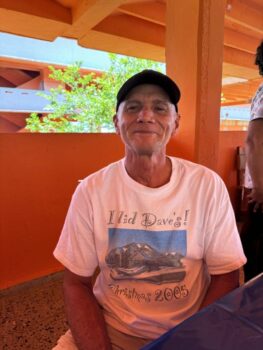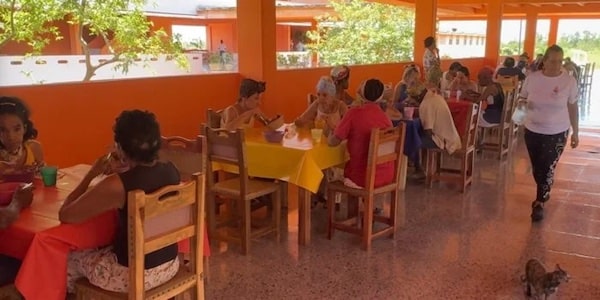Within the United States, homelessness has become a permanent feature of the capitalist system, and around 650,000 U.S. residents sleep on the streets on any given night. In the last 30 years, the average age of homeless individuals in the United States has risen from 30 to 50. Politicians in Washington, meanwhile, dream up new ways to slash Social Security and Medicare, leaving future generations anticipating poverty in lieu of a secure retirement after decades of work. As the U.S. capitalist system furthers itself into crisis, aging populations are not spared from its crosshairs. But Cuba provides an alternative model.
As part of a delegation of 20 U.S. activists with the Hatuey Project, I was able to visit the Quisicuaba Agricultural Camp in Artemisa Province, Cuba. While there, I observed an alternative to how a society could treat its more vulnerable individuals, especially those that need crucial support later in life. The camp is but another example in which Cuba’s socialist system ensures dignity and independence in the later years of one’s life aren’t sacrificed and replaced with neglect, abuse and loneliness.
Ambulant persons in Cuba
In Cuba, landlordism is abolished and 80% of the population own their own home. This stands in stark contrast to the United States, where the majority of everyday people are slaves to rent payments, mortgages and the banks that collect them with interest. Housing is a human right in Cuba even as the country experiences a housing shortage, and the socialist system has virtually eliminated homelessness in Cuba.
However, as reforms since the collapse of an alternative world socialist system in the 1990s allowed for the selling of one’s home, some families sell their house and leave extended family in Cuba on their own. This has resulted in many elderly and those that need extra care to be left without family support. In some cases the person sold their home to finance emigration which ended up unsuccessful, and then were left without housing as a result.
In Cuba, sleeping in public places, digging through trash for food and begging is referred to as “ambulant behavior,” rather than “homelessness.” The top causes for ambulant behavior can be attributed to alcoholism, mental illness and loss of family support.
Ambulant persons as a phenomenon in Cuba has been produced by the decades-long policies and economic, diplomatic and covert war on the socialist revolution in Cuba, where Washington’s policies have sought hundreds of measures to bring the archipelago back into its colonial control. Ambulant behavior has increased with the ever more severe conditions brought on by the U.S. blockade in recent years.
Even amidst these measures, which have cost the Cuban people an estimated $1 trillion since the revolution’s victory in 1959, the Cuban government has continually been able to guarantee a right to housing to every single Cuban.
‘This place has changed my life for the better’
After a 40 kilometer ride outside of the Cuban capital of Havana, we were greeted at the Quisicuaba Agricultural Camp by Enrique Alemán, a doctor by profession but is also well known as a community and religious leader. Alemán is also a member of the National Assembly for People’s Power.
Alemán explained,
We have the house of the elderly, we have hospitals for special attention, centers of social protection, and a housing program that has been a victory of the revolution.
In explaining the role, he continued,
We are working with the whole family and different ages, not only the elderly. And for a positive reentry into society.
Contrasting the role of homeless shelters and nursing homes in the United States–the latter of which are for profit and seen largely as a dumping ground for elders within a family or community–the goal of Quisicuaba is rehabilitation so that the ambulant person is able to reenter society. While everyone deserves to be a part of society, only in a socialist society is everyone afforded that right.
Quisicuaba was converted from an old school building, and every person is provided accommodation and medical and psychological treatment. There is a farm where, together, the inhabitants grow cassava, sweet potatoes, bananas and livestock like sheep, goat and poultry. There is a common dining hall where residents are provided three meals a day. Currently Quisicuaba shelters 130 people, but Alemán told us they plan on expanding to accommodate 580 in the future.
Our delegation entered while a morning prayer circle was being held, where residents both of faith and atheists met together and shared their manifestations of the day. One resident, an elderly woman, called for well wishes and prayers for the population of Gaza suffering from the U.S-Israeli genocide. Soon after, the residents began morning exercise routines.

Carlos, resident of Quisicuaba. (Photo: Benjamin Zinevich)
Although Quisicuaba was formed by civil society, Alemán explained, “This is in tune with the political will of the country,” emphasizing that only through the socialist system and Cuban revolution could a program like this be achieved.
Yet, the United States goes to great lengths to ensure that no facet of Cuban society is left untouched by the criminal blockade. Alemán confirmed that “the blockade has presented a great test to these gains of the revolution. Due to the lack of material resources withheld by the blockade, it has disrupted the realization of many housing programs.”
Amidst this, the testimonials our delegation gathered highlighted the life-changing role Quisicuaba plays.
I met Carlos, a man in his 70s, who had lived his life in Havana as an English professor. Carlos struggled with alcoholism, and although he picked up a job at a hospital after retirement as a custodian, his relationship soured with his family, and he was left in an ambulatory situation. One day, Carlos’s liver suffered complications, and he fell unconscious, collapsing onto the street, where he almost was hit by a car. Luckily, an ambulance arrived rapidly, and he was treated.
Today, Carlos has lived in Quisicuaba for several months, lifting weights and remaining active and social.
Before departing, Carlos asked for me to take his photo, concluding with a clear statement:
This place has changed my life for the better.

